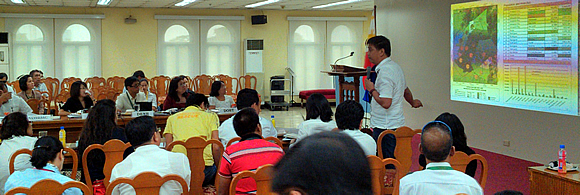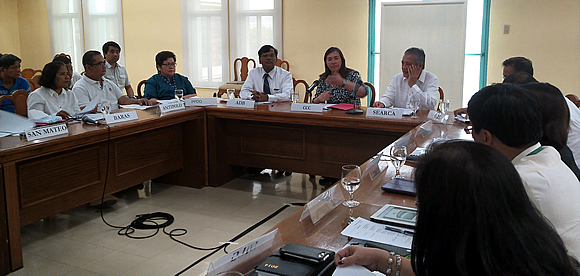The Climate Change Commission (CCC) is the implementing agency of this TA, while the Southeast Asian Regional Center for Graduate Study and Research in Agriculture (SEARCA), in partnership with ERGONS Project Marketing Consultants, has been commissioned by ADB to conduct the study.
Secretary Mary Ann Lucille L. Sering of the Climate Change Commission started the meeting by echoing the instructions of President Benigno S. Aquino III to scale up the initiatives between 2014 to 2016. She said that, primarily, the President wants any plan or program be based, at least, on a vulnerability assessment.
Secretary Sering pointed out that the synergy in urban and rural settings in UMRBPL is interesting. She then encouraged the local government units (LGUs) to seriously reflect on the results presented because anything that has got to do with climate change should be at the LGU level. Though the results of the study are just recommendatory, she said that it is up to the LGU to integrate them in their respective Comprehensive Land Use Plans (CLUPs).
Subsequently, Dr. Ancha Srinivasan, ADB Principal Climate Change Specialist under the Environment, Natural Resources and Agriculture Division, Southeast Asia Department (SERD), emphasized that it is important to build on what has been learned, overcome failures, and if there are, improve from that angle. He asked the project stakeholders and LGUs to provide feedback whether expectations are being met and, if not, suggest improvements so that the consulting team can work and incorporate them in the reports accordingly. Dr. Ancha also informed the group that there is another ADB project basically expanding the scope to other watersheds.
Dr. Gil C. Saguiguit Jr., SEARCA Director, thanked CCC and ADB for entrusting the EcoTown Project to SEARCA-ERGONS.
“Our Center which is charged with promoting inclusive and sustainable agricultural and rural development in the Philippines and the Southeast Asian Region, considers climate change as a very important focus over the years to come. It affects livelihood, food security, health and the overall well-being of our people, as well as the sustainable development of our country.” Saguigit said.
Reiterating the significance of the project, Dr. Saguiguit said that the reports, at the very least, provide science-based information on the vulnerability and risks faced by UMRBPL, which is one of the most important watersheds in the Philippines.
Mr . Elmer Mercado, the Project Team Leader, stressed that the reports are part of the integral components of the EcoTown Framework. They are prerequisite activities to help identify possible mitigation and adaptation measures, guide decision making and policy making, and rationalize development planning down to the local and grassroots levels in response to the projected effects and risks brought about by climate change.
. Elmer Mercado, the Project Team Leader, stressed that the reports are part of the integral components of the EcoTown Framework. They are prerequisite activities to help identify possible mitigation and adaptation measures, guide decision making and policy making, and rationalize development planning down to the local and grassroots levels in response to the projected effects and risks brought about by climate change.
The meeting was held at the Mabini Hall of Malacañang. Secretary Sering presided over the meeting, which was attended by at least 45 participants coming from the concerned LGUs, as well as representatives from key government agencies, namely, the Department of Environment and Natural Resources (DENR), University of Rizal System (URS), Philippine Rural Development Foundation(PDRF), Department of Science and Technology (DOST), National Economic and Development Authority (NEDA), Department of Interior and Local Government (DILG), and the Department of Energy (DOE). (Jose Rey Y. Alo)
